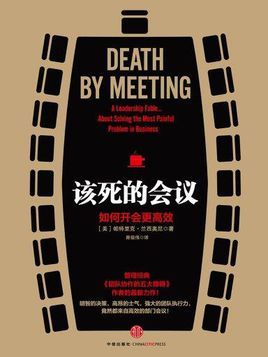会议是CEO的舞台 帕特里克.兰西奥尼 2019.9.24 Meetings Are A Chief Executive’s Stage By Patrick Lencioni September 24,2019
如果你要评估一个外科医生的技能,你想在哪里观察呢?在手术期间的手术室,对吧?演员呢?当然在舞台上;老师呢?很显然,在和学生一起上课的教室。你知道要领了。 If you were going to evaluate a surgeon’sskill, where would you want to observe her? In the operating room duringsurgery, right? What about an actor? On stage,of course. And how about a teacher? Clearly, in a class with students. You getthe idea.
振作起来想:评估 CEO 的最佳环境在哪里?答案只有一个:在会议室里与他或她的高管团队开会时。虽然这很难接受,可还能在哪里呢?Now brace yourself: What would be the bestsetting for evaluating a CEO? There is only one answer: in a conference roomhaving a meeting with his or her executive team. As hard as that might be toaccept, what else could it be?
然而,许多CEO公开抱怨会议,这太荒谬了。想象一下,一个外科医生抱怨手术室或演员抱怨舞台。如果是这样,可能会建议他们改行。但不知何,我们开始接受了,他们惧怕会议是有道理的。这值得仔细研究。 Yet, many CEOs openly complain aboutmeetings—which is ridiculous. Imagine a surgeon complaining about the operatingroom or an actor about the stage. You’d probably advise them to change careers.But somehow, we’ve come to accept that it is reasonable to dread meetings. Thisdeserves a closer look.
公平地说,CEO们讨厌会议是有充分理由的——大多数会议确实开得很糟糕,无聊、无聚焦,产生非常少的收益,但会议本不应该这样。事实上,这种无聊和不聚焦的罪魁祸首完全在会议领导人身上。To be fair, CEOs hate meetings for a goodreason—most of them are, indeed, awful. They are boring and unfocused, yieldingfar too little benefits. But they shouldn’t be. In fact, the blame for thatboredom and lack of focus falls squarely on the person leading the meeting.
幸运的是,有可行的解决方案。Fortunately, there is a workable solution.
要接受这一解决方案,CEO 们必须首先改变两个有关会议的观念。首先,必须接受会议本身不是天生不好; 改善会议是可能的。第二,必须接受举行更多会议的想法。没错,更多的会议。To embrace that solution, CEOs must firstchange two preconceived notions about meetings. First, they must accept thatmeetings are not inherently bad; improving them is possible. Second, they mustembrace the notion of having more meetings. That’s right, more meetings. Bearwith me.
高管团队会议最大一个问题是“会议乱炖”。太多的CEO就像厨师一样,走进橱柜,拿出各种食材,混放入锅中,还奇怪为什么味道这么差。这就是他们把从战略到战术、再到日常管理等近乎所有的内容都塞进每周一次的高管会议上。这使与会者感到困惑:是否应该头脑激荡,还是要做出决策、投票或仅是接收信息。需要做的是,就不同主题分别开会议,为这些不同的会议创建更大的场域。The single biggest problem with executiveteam meetings is “meeting stew.” Too many CEOs are like cooks who go into thecupboard and pull out every ingredient, mix it into a single pot, and then wonderwhy it tastes so bad. That’s what happens when they try to cram everything fromstrategy to tactics to administrivia into one weekly staff meeting, confusingparticipants as to whether they’re supposed to be brainstorming, makingdecisions, voting or just receiving information. What they need to do is creategreater context by having separate meetings for different topics.
在预知风险下,CEO应与其领导团队举行四种不同的会议:每日会以交换日常管理信息(仅 5-10 分钟!);每周战术会,回顾目标进展并解决近期问题(45~90分钟); 特定战略会,需要更深入分析和解决问题的单个主题(对较大主题,2-4小时); 以及在场外的季度会,以评估公司状况、行业形势和团队动力(1-2 天)。At the risk of being prescriptive, CEOsshould be having four different meetings with their leadership teams: dailymeetings to exchange administrative information (5–10 minutes only!); weeklytactical meetings to review progress and solve near-term problems (45–90minutes); ad hoc strategic meetings to take on singular topics that requiremore extensive analysis and problem-solving (2–4 hours for big, hairy topics);and quarterly off-site reviews for assessing the state of the company, thelandscape of the industry and the dynamics of the team (1–2 days).
这听起来好像会议太多,其实总和起来,你会发现,这不超过领导者15%的时间,这足以证明其合理性。只要这些会议令人注目并有效, 任何领导者都无法令人信服地宣称他们不该花15%的时间与高管团队在一起开会。If that sounds like too many meetings, addit up and you’ll find that it is no more than 15 percent of a leader’s time,which is easily justifiable. No leader could credibly claim that she shouldn’tspend 15 percent of her working hours with her executive team—as long as thosemeetings are compelling and effective.
实现这一目标的最佳方式是确保会议中充满思想碰撞-良性冲突。领导者认为会议无聊的最重要的原因之一是缺乏健康的激烈和有益的分歧。没有人认为一个高度解决问题的会议无聊和沮丧。他们会用尽全力并才感觉松了一口气。用尽全力,是因为他们积极投入并焦急地关注的会议结果;感觉松了一口气,是因为当他们回到自己的团队时,他们有了明确的前进指令,该指令是建立在热烈的无须掩饰的思想交换基础上的。And the best way to accomplish that is toensure the meeting has plenty of conflict. That’s right. One of the biggestreasons leaders find meetings boring is a lack of healthy tension anddisagreement. No one leaves an intense problem-solving meeting bored andfrustrated. They are exhausted and relieved. Exhausted because they wereengaged and anxious about the outcome of the conversation, and relieved becausethey can go back to their teams with clear marching orders based on a rigorousand unfiltered exchange of ideas.
实现这样的开会是完全可能的。我见过非常多的CEO们,他们经历过了从恐惧开会到享受开会-简单地, 避免会议乱炖并鼓动富有成效的冲突。 我想,他们现在看到他们的会议,就像一个演员看到一出剧、一个外科医生看到手术或老师看到一场教学。我喜欢听到CEO们自豪地承认,会议是他们最喜欢的工作之一。Achieving that is entirely possible. I’ve seen so many CEOs go from dreading meetings to relishing them simply by avoiding meeting stew and inciting productive conflict. I like to think that they now see their meetings as an actress sees a play, a surgeon sees an operation or a teacher sees a class. And I love to hear them proudly admit that meetings are their favorite part of being a CEO。
见团队领导力大师 兰西奥尼系列著作 读书会
